|
|
|
Sort Order |
|
|
|
Items / Page
|
|
|
|
|
|
|
| Srl | Item |
| 1 |
ID:
130866


|
|
|
|
|
| Publication |
2014.
|
| Summary/Abstract |
Curbing corruption is vital for China's future. But the exposure of corruption cases can only damage public confidence in the CCP and the state more generally. Corruption associated with toxic food, bogus medicines, grave abuses of power and criminal 'black societies' has produced a series of public scandals in China. Without reform, further occurrences could rapidly erode the legitimacy not just of the police and other judicial organs, but also of the ruling Chinese Communist Party (CCP). The recent trial of Bo Xilai, the former Chongqing party secretary and member of the party's elite 25-member Politburo, showcased the kind of corruption that China's past president Hu Jintao warned could lead to 'the collapse of the Party and the downfall of the state'. In 2011, the Bank of China inadvertently reported that between 1994-2008 as many as 18,000 corrupt officials had fled the country for destinations in Europe, America and other parts of Asia, plundering an estimated $120 billion from state-owned enterprises and other criminal activities. The costs of maintaining domestic public order have also grown rapidly, and, for the first time, domestic security outlays approved by the 2012 National People's Congress (NPC) exceeded defence, in part over concerns about the growth of mass protests, fraud, corruption and organised crime, and the need to strengthen weiwen (stability) and social harmony.
|
|
|
|
|
|
|
|
|
|
|
|
|
|
|
|
| 2 |
ID:
153360
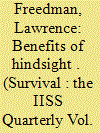

|
|
|
|
|
| Summary/Abstract |
This article draws largely on my experience as the Official Historian of the Falklands Campaign, and then as a member of the UK inquiry into the Iraq War. My aim is to explore the particular challenges faced when charged with holding ministers, officials and officers directly to account. Although I was solely responsible for the Falklands history, I was part of a team working on the Iraq Inquiry, led by Sir John Chilcot. Not only am I speaking for myself, but it is not my intention to offer revelations about the workings of the inquiry.1 In practice, the work was relatively straightforward. Despite pre-publication comments about the length of the report and the time it had taken to prepare, the reasons for this were apparent on publication. The panel stuck together despite irritating and at times intrusive media speculation; the report’s findings did not leak in advance; and any disagreements, which rarely touched on the broad thrust of the report, were always settled without fuss. Compared with other inquiries, we were not even that expensive. Academics and former mandarins come at a discount to lawyers.
|
|
|
|
|
|
|
|
|
|
|
|
|
|
|
|
| 3 |
ID:
149692
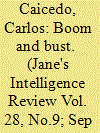

|
|
|
|
|
| Summary/Abstract |
Brazil is reeling from the combined impact of a high-profile corruption scandal, political instability, and a downturn in its economy. Carlos Caicedo sets out three scenarios for the country's political outlook over the next two years and the likely security impacts.
|
|
|
|
|
|
|
|
|
|
|
|
|
|
|
|
| 4 |
ID:
158688
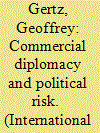

|
|
|
|
|
| Summary/Abstract |
The modern investor-state arbitration regime was explicitly designed to replace commercial diplomacy as a mechanism for protecting foreign investment. I argue, however, that diplomacy continues to play an important role in managing political risk, particularly in countries with weak rule of law. Yet, since commercial diplomacy occurs primarily behind closed doors, it is difficult to observe, let alone test for its effects. To overcome this obstacle, I exploit variation in vacancies among US ambassadors to foreign countries—conditions overwhelmingly driven by US domestic political factors—which provides for a quasi-natural experiment for testing the effects of commercial diplomacy. I show that American firms operating abroad are significantly more likely to initiate investor-state arbitration disputes during temporary vacancies in US ambassadorships. The effects of these vacancies prove particularly strong in countries with weak rule of law. The results suggest American investors frequently seek assistance from the US government in informally resolving incipient investment disputes; if diplomatic channels are unsuccessful or unavailable, investors then file formal arbitration cases. These findings underline that, even in highly legalized issue areas in world politics, such as investment protection, informal diplomacy continues to influence important political economy outcomes.
|
|
|
|
|
|
|
|
|
|
|
|
|
|
|
|
| 5 |
ID:
133643
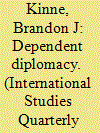

|
|
|
|
|
| Publication |
2014.
|
| Summary/Abstract |
Diplomatic recognition is an essential tool of statecraft but remains largely unanalyzed by political scientists. Two recent trends in diplomatic practice raise notable puzzles: (i) use of diplomatic ties to signal (dis)approval of a regime or its policies, based largely on cues from diplomatic partners, and (ii) reliance on diplomatic missions as a means of securing prestige in the international system. I argue that both trends are the result of network influences. States face resource constraints and must choose diplomatic partners wisely, but they lack complete information about the risks and benefits of extending diplomatic recognition. To solve this informational dilemma, they condition recognition on the diplomatic activity of others. First, states send missions to countries that host missions from their own diplomatic partners, which increases the strength of diplomatic signals and reduces political risks. Second, states send missions to countries that host large numbers of missions in general (that is, "prestigious" countries), which increases their capacity for information gathering. In general, a state's decision to extend or retract diplomatic recognition depends heavily on the decisions of other states. Employing novel network methodologies, I show that these endogenous network influences are among the most consistent and substantively powerful determinants of diplomatic recognition.
|
|
|
|
|
|
|
|
|
|
|
|
|
|
|
|
| 6 |
ID:
148607


|
|
|
| 7 |
ID:
187641
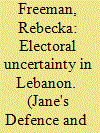

|
|
|
| 8 |
ID:
161599
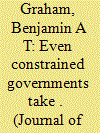

|
|
|
|
|
| Summary/Abstract |
This article analyzes an understudied and contested form of government taking, transfer restriction, which has supplanted expropriation as the most ubiquitous and costly type of international property rights violation. Veto-player-type constraints curtail governments’ ability to engage in outright and (nontransfer related) creeping expropriation but have little impact on their ability to generate wealth via transfer restrictions. We use a formal model to derive testable implications regarding the effect of political institutions and domestic politics on governments’ ability to collect these two types of rent. Empirically, we use novel time-series cross-sectional data to show that while veto-player-type political constraints diminish expropriation risk, transfer risk is much less affected: even constrained governments impose transfer restrictions.
|
|
|
|
|
|
|
|
|
|
|
|
|
|
|
|
| 9 |
ID:
151791
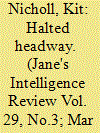

|
|
|
| 10 |
ID:
187729
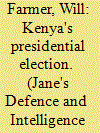

|
|
|
| 11 |
ID:
128846
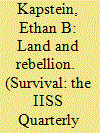

|
|
|
|
|
| Publication |
2014.
|
| Summary/Abstract |
A study of land reform illuminates the paradox of economic instruments in counter-insurgency. Where redistributive demands are at the core of a rebellion, foreign powers will find it difficult to respond effectively. Recent years have seen the United States and its allies embroiled in major counter-insurgency campaigns in Afghanistan and Iraq, and lesser operations in such countries as Yemen and Somalia. These battles against local insurgencies are only the latest in a string of such conflicts that have erupted in nearly every developing region since the end of the Second World War. Sharply debated at home and abroad, they raise the fundamental question of what the counter-insurgents can reasonably hope to achieve in violent settings, even when they deploy an array of military, political and economic instruments. What are the 'moving parts' that foreign powers can manipulate in their efforts to force or encourage violence-reducing reforms in these societies?
|
|
|
|
|
|
|
|
|
|
|
|
|
|
|
|
| 12 |
ID:
120109
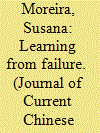

|
|
|
|
|
| Publication |
2013.
|
| Summary/Abstract |
Thirsty for oil and other raw materials needed to fuel its breakneck development, China is funnelling money and manpower into an expanding number of countries in order to secure access to natural resources. This effort has successfully increased Chinese oil assets overseas but it has also exposed Beijing and Chinese national oil companies (NOCs) to significant risks. The present paper focuses on one type of risk - political risk - and how it has affected China's global quest for oil since 1993. It starts with a brief overview of political risk. It then looks at political risk management as applied to the oil industry in general. The paper continues with a discussion of the political risk management of Chinese national oil companies over time. This includes a concise exam-ination of several instances in which the interests of Chinese NOCs have been undermined due to political risk and the shortcomings in the approaches of Chinese NOCs to political risk. Recent developments suggest that Chinese NOCs are learning from these mistakes and adjusting their strategies accordingly. Although progress toward these readjust-ments has been made, China's own socio-political context is still hampering the ability of Chinese NOCs to deal with on-the-ground realities that are clearly much more unstable than China's own.
|
|
|
|
|
|
|
|
|
|
|
|
|
|
|
|
| 13 |
ID:
114416
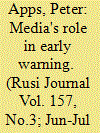

|
|
|
|
|
| Publication |
2012.
|
| Summary/Abstract |
Peter Apps, political risk correspondent for Reuters, reflects on the roles and responsibilities of journalists in war reporting, and argues that, based on his observations of newswires' presence on the ground, foreign correspondents can fulfil a crucial 'early warning' function.
|
|
|
|
|
|
|
|
|
|
|
|
|
|
|
|
| 14 |
ID:
086095
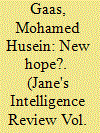

|
|
|
| 15 |
ID:
156016
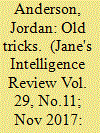

|
|
|
| 16 |
ID:
149822
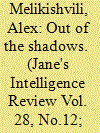

|
|
|
|
|
| Summary/Abstract |
Uzbekistan is showing signs of easing the repression exercised by late president Islam Karimov. Alex Melikishvili analyses the extent to which the country will move away from its post-Soviet isolation and embrace reform, as well as improve external relations.
|
|
|
|
|
|
|
|
|
|
|
|
|
|
|
|
| 17 |
ID:
131880
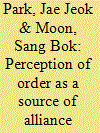

|
|
|
|
|
| Publication |
2014.
|
| Summary/Abstract |
The level of alliance cohesion is affected by the shift of attitudinal aspects (such as homogeneity in goals and threat perceptions) and behavioural aspects (such as strategic compatibility, command structure and defence burden-sharing) of alliance operation. In particular, a clear threat perception tends to make an alliance cohesive, as it suppresses (potential) disputes over the behavioural aspects of alliance operation. This article argues, however, that it is not sufficient to evaluate whether an alliance is cohesive or not only by looking at how these attitudinal and behavioural indicators have changed over time. If it were sufficient to do so, it would be supposed that the level of alliance cohesion would be bound to become lower with a change of government from conservative political forces to liberal ones in cases such as those of the US-ROK and the US-Japan alliances. We argue that the list of indicators for alliance cohesion should include not only attitudinal and behavioural aspects of alliance operation, but also functional aspects. While serving its primary purpose of responding to a specific threat, an alliance incurs an additional function of serving to maintain or to build a favourable regional order that is appreciated by both liberal and conservative governments. The interests in relation to order-building and order-maintenance motivate allies to invest for the alliance, often at their own political risk, even while they are engaged in contentious negotiations with the United States over attitudinal and behavioural aspects of alliance operations. Such investments can be considered as a different type of alliance burden sharing than has heretofore been given adequate attention. The investments indeed consolidate the alliance, paving the way for further upgrading of the alliance as conditions warrant.
|
|
|
|
|
|
|
|
|
|
|
|
|
|
|
|
| 18 |
ID:
134030
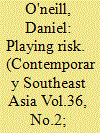

|
|
|
|
|
| Publication |
2014.
|
| Summary/Abstract |
Weak rule of law, corruption and political risk are factors found to deter foreign direct investment (FDI) and all are characteristics of Cambodia's investment environment. Yet Chinese outward FDI has been found to contradict these general trends, as illustrated by high levels of Chinese investment in Cambodia. This article analyses how Chinese firms are able to successfully invest in Cambodia and finds that variation in ownership type (state owned or private), investment size and the degree of mobility of the assets invested determine the Chinese investor's strategy. For China's state owned enterprises (SOEs) in the hydropower sector, Chinese government support in the form of aid and loans to the government of Cambodia secures approval and protection for investments. Private Chinese firms with smaller and more mobile investments in Cambodia's garment industry, on the other hand, rely on industry-wide collective action facilitated by cultural and linguistic ties both to other ethnically Chinese foreign investors and to Chinese Cambodians in the industry. Finally, in the land and resource sector, Chinese firms secure a politically connected local stakeholder to gain approval and protection for large investments.
|
|
|
|
|
|
|
|
|
|
|
|
|
|
|
|
| 19 |
ID:
172333


|
|
|
|
|
| Summary/Abstract |
When do governments impose costs on foreign firms? Many studies of foreign direct investment focus on incentives for government expropriation, but scholars are often forced to rely on indirect measures of expropriation to conduct empirical analyses. This article introduces a data set which includes information on over 5,000 political risk insurance contracts issued by the US Overseas Private Investment Corporation since 1961, and on all the claims filed by investors under these contracts. These detailed insurance data allow us to study the determinants of foreign investors’ losses from a variety of sources, including expropriation, inconvertibility, and violent conflict. To illustrate the benefits of these data for hypothesis testing, we adopt a comprehensive empirical approach and explore both shared and distinct causes across risk categories.
|
|
|
|
|
|
|
|
|
|
|
|
|
|
|
|
| 20 |
ID:
179274
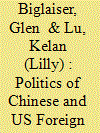

|
|
|
|
|
| Summary/Abstract |
In the foreign direct investment (FDI) literature, studies show that investors prefer low-risk host states. However, the research focuses on investors from developed country democracies, such as the United States, ignoring the rise of China, an authoritarian developing country that engages in public and private investment. This paper investigates Chinese state and private FDI in 127 developing countries from 2003 to 2017 to determine the effects of political risk on FDI. We find that, as with US FDI, low-risk developing countries attract more Chinese state FDI, except in the case of natural resource investment, where Chinese investors appear to disregard risk concerns. For Chinese private FDI, on the other hand, political institutions seem to play no significant role, but political affiliations matter. Our work suggests that similarities between US and Chinese state FDI are increasing, while the investment strategies of Chinese private and state firms appear to be growing farther apart.
|
|
|
|
|
|
|
|
|
|
|
|
|
|
|
|
|
|
|
|
|